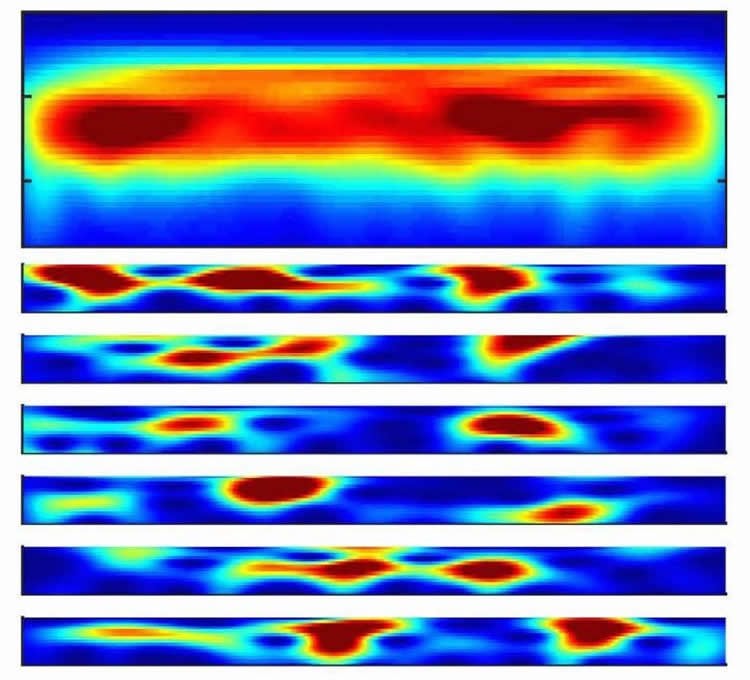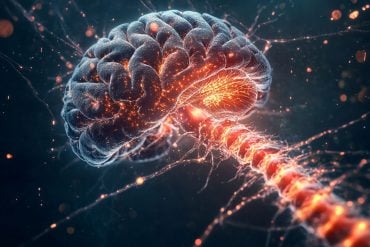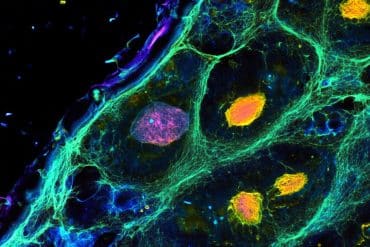Summary: In both human and animal subject, bursts of beta wave activity in the brain help to filter distraction in order to process different sensations, a new study reports.
Source: Brown University.
To better understand the brain and to develop potential therapies, neuroscientists have been investigating how “beta” frequency brainwaves help the brain filter distractions to process sensations. A new Brown University study stands to substantially refine what they thought was going on: What really matters is not a sustained elevation in beta wave power, but instead the rate of specific bursts of beta wave activity, ideally with perfect timing.
The new insight, reported in the journal eLife, arose from the scientists looking beneath the covers of the typical practice of averaging beta brain wave data. With a closer examination, trial-by-trial for each subject, they saw that what really reflected attention and impacted perception were discrete, powerful bursts of beta waves at frequencies around 20 hertz.
“When people were trying to block distraction in a brain area, the probability of seeing these beta events went up,” said senior author Stephanie R. Jones, an associate professor of neuroscience at Brown. “The brain seemed to be flexibly modulating the expression of these beta events for optimal perception.”
The findings, made with consistency in humans and mice, can not only refine ongoing research into how beta waves arise and work in the brain, Jones said, but also provide guidance to clinicians as they develop therapies that seek to modulate beta waves.
Testing touch
The research team, led by graduate student Hyeyoung Shin, acquired the data through a series of experiments in which they measured beta waves in the somatosensory neocortex of humans and mice in the second leading up to inducing (or not inducing) varying amounts of a tactile sensation. Humans wore a cap of magnetoencephalography sensors, while mice had implanted electrodes. For people, the sensation was a tap on a finger tip or the foot. For mice, it was a wiggle of a whisker.
Subjects were merely required to report the sensations they felt — people pushed a button, while mice were trained to lick a sensor in exchange for a reward. The researchers tracked the association of beta power with whether subjects accurately detected, or didn’t detect, stimuli. What they found, as expected, is that the more beta activity there was in the corresponding region of cortex, the less likely subjects were to report feeling a sensation. Elevated beta activity is known to help suppress distractions.
A particularly good example, Shin said, was that in experiments where people were first instructed to focus on their foot, there was more beta power in the hand region of the neocortex. Correspondingly, more beta in the hand region resulted in less detection of a sensation in the hand.
“We think that beta acts a filter mechanism,” Shin said.
Beta bursts
Consistently throughout various iterations of the experiments across both the human and mouse subjects, increases in beta activity did not manifest as a continuously elevated rhythm. Instead, when beta appeared, it quickly spiked in short, distinct bursts of power. Only if a subject’s beta was averaged over many trials would it look like a smooth plateau of high-power activity.
After discovering this pattern, the researchers performed analyses to determine what features of the bursts best predicted whether subjects would report, or miss, a touch sensation. After all, it could be the number of bursts, their power, or maybe how long they lasted.
What Shin and the team found is that number of bursts and their timing both mattered independently. If there were two or more bursts any time in the second before a sensation, it was significantly more likely to go undetected. Alternatively, if just one burst hit within 200 milliseconds of the sensation, the stimulus would also be more likely to be overlooked.
“The ideal case was having large numbers and being close in timing to the stimulus,” Shin said.
A better idea of beta
While the study helps to characterize the nature of beta in the somatosensory neocortex, it doesn’t explain how it affects sensations, Jones acknowledged. But that’s why it is important that the results were in lockstep in both mice and in people. Confirming that mice model the human experience means researchers can rely on mice in experiments that delve more deeply into how beta bursts arise and what their consequence are in neurons and circuits. Shin is already doing experiments to dissect how distinct neural subpopulations contribute to beta bursts and somatosensory detection, respectively. Co-author and postdoctoral researcher Robert Law is applying computational neural models that link the human and animal recordings for further discovery.

In the clinical realm, Jones said, an improved understanding of how beta works could translate directly into improving therapies such as transcranial magnetic stimulation or transcranial alternating current to treat neurological disorders, such as chronic pain, or depression. Rather than using those technologies to generate a consistent elevation in beta in a brain region, Jones said, it might be more effective to use them to induce (or suppress) shorter, more powerful bursts and to time those to be as close in time to a target brain activity as possible.
“Typically with non-invasive brain stimulation you are trying to entrain a rhythm,” Jones said. “What our results suggest is that’s not what the brain is doing. The brain is doing this intermittent pattern of activity.”
The findings could also help scientists better understand other beta-associated disorders, such as Parkinson’s disease or obsessive compulsive disorder, and influence brain computer interfaces that rely on beta activity.
The paper’s other authors are Shawn Tsutsui and Christopher Moore.
Funding for the research came from the National Institutes of Health, the U.S. Department of Veterans Affairs, the National Science Foundation, the Brown Institute for Brain Science and the Fulbright Association.
Source: David Orenstein – Brown University
Publisher: Organized by NeuroscienceNews.com.
Image Source: NeuroscienceNews.com image is credited to Shin et. al./Brown University.
Original Research: Abstract for “The rate of transient beta frequency events predicts behavior across tasks and species” by Hyeyoung Shin, Robert Law, Shawn Tsutsui, Christopher I Moore, and Stephanie R Jones in eLife. Published online November 6 2017 doi:10.7554/eLife.29086
[cbtabs][cbtab title=”MLA”]Brown University “Bursts of Beta Waves, Not Sustained Rhythms, Filter Sensory Processing in Brain.” NeuroscienceNews. NeuroscienceNews, 8 November 2017.
<https://neurosciencenews.com/beta-waves-sensory-processing-7896/>.[/cbtab][cbtab title=”APA”]Brown University (2017, November 8). Bursts of Beta Waves, Not Sustained Rhythms, Filter Sensory Processing in Brain. NeuroscienceNews. Retrieved November 8, 2017 from https://neurosciencenews.com/beta-waves-sensory-processing-7896/[/cbtab][cbtab title=”Chicago”]Brown University “Bursts of Beta Waves, Not Sustained Rhythms, Filter Sensory Processing in Brain.” https://neurosciencenews.com/beta-waves-sensory-processing-7896/ (accessed November 8, 2017).[/cbtab][/cbtabs]
Abstract
The rate of transient beta frequency events predicts behavior across tasks and species
Beta oscillations (15-29Hz) are among the most prominent signatures of brain activity. Beta power is predictive of healthy and abnormal behaviors, including perception, attention and motor action. In non-averaged signals, beta can emerge as transient high-power ‘events’. As such, functionally relevant differences in averaged power across time and trials can reflect changes in event number, power, duration, and / or frequency span. We show that functionally relevant differences in averaged beta power in primary somatosensory neocortex reflect a difference in the number of high-power beta events per trial, i.e. event rate. Further, beta events occurring close to the stimulus were more likely to impair perception. These results are consistent across detection and attention tasks in human magnetoencephalography, and in local field potentials from mice performing a detection task. These results imply that an increased propensity of beta events predicts the failure to effectively transmit information through specific neocortical representations.
“The rate of transient beta frequency events predicts behavior across tasks and species” by Hyeyoung Shin, Robert Law, Shawn Tsutsui, Christopher I Moore, and Stephanie R Jones in eLife. Published online November 6 2017 doi:10.7554/eLife.29086






